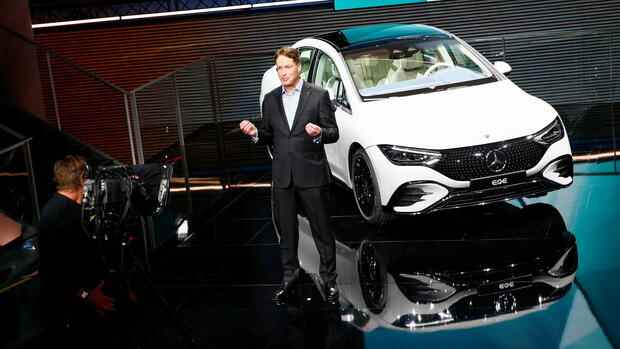Vienna War, inflation, turnaround in interest rates: A “perfect storm” has brewed over the entire European industry, announced Mercedes boss Ola Källenius just a few days ago. The manager observes an unprecedented “macro nervousness”. To date, however, his company has felt almost nothing of this in day-to-day business. On the contrary: the Stuttgart-based carmaker continues to earn splendidly despite the many crises.
In the third quarter, the Dax group was able to increase its operating profit adjusted for special effects from 3.1 to 5.3 billion euros. Sales increased by almost a fifth to around 38 billion euros. The bottom line is that the Mercedes-Benz Group was able to double the quarterly profit to almost four billion euros compared to the previous year’s result, which was heavily burdened by the lack of chips.
At 14.5 percent, the adjusted return on sales in the dominant car division is currently almost six percentage points higher than in the previous year; those in the van division, at 12.7 percent, are even more than seven percentage points higher. The result: the Swabians raise their outlook again.
In the passenger car unit, Mercedes is now forecasting a margin of 13 to 15 percent for the year as a whole instead of 12 to 14 percent. In the van division, the profit margin should be nine to eleven percent at the end of the year. In July, the company had given a somewhat more pessimistic forecast of eight to ten percent.
Top jobs of the day
Find the best jobs now and
be notified by email.
Meanwhile, Mercedes is leaving the outlook for the financial division unchanged. Here the company expects a return on equity of up to 18 percent. However, earnings before interest and taxes (EBIT) for the entire group should now be “significantly higher” instead of just “slightly higher” than that of the previous year.
40 percent increase in sales compared to the previous year
CFO Harald Wilhelm spoke on Wednesday in an initial reaction of “robust demand”, which brought Mercedes a solid result. “In combination with the ongoing cost discipline, we are making the company more resilient and are thus also setting the pace for the coming months. The transformation of Mercedes-Benz is constantly gaining momentum,” explained the manager.
The basis for the success was a significant increase in sales. Specifically, Mercedes was able to increase its car sales to end customers from July to September to 530,000 units. This corresponds to an increase of almost 40 percent compared to the previous year. Thanks to the high level of deliveries in the last quarter, sales after nine business months also turned positive and are now slightly above the previous year’s value at four percent.
>> Also read: Premiere of the EQE: Mercedes hopes for the first electric bestseller
However, Mercedes recently struggled with certification problems with the S-Class in the USA. The luxury sedan is still the group’s most important guarantee of returns, with margins in excess of 20 percent. In addition, the group’s electric offensive was slowed down. As a result of corona lockdowns in China, an important component that is in all of the group’s electric models could hardly be produced for two months.
Nevertheless, Mercedes boasts that it has increased sales of electric cars by 65 percent to 96,000 vehicles after three quarters. At the same time, there would have been more here. Especially since the proportion of purely electric models in relation to total sales is just 6.4 percent.
More AMG, less A-Class
Under Mercedes CEO Ola Källenius, Mercedes is fully committed to luxury. Rather unprofitable model series such as the A-Class and B-Class will be gradually phased out in the coming years. Rather, the Swede wants to grow with particularly posh bodies that promise high profit margins. In addition to the S-Class, this includes the massive GLS SUV, the G-Class off-road vehicle and the makes of the noble sub-brand Maybach and the tuning subsidiary AMG.
This course is already giving Mercedes new record profits. After nine business months, the Swabians have generated a bottom line result of almost eleven billion euros. That is a quarter more than in the same period in 2021. Sales are up by more than eleven percent, at 109 billion euros. Only the adjusted free cash flow in the industrial business is 23 percent lower than in the previous year at 6.6 billion euros.
However, analysts are wondering how long Mercedes can continue to achieve top returns given the large number of crises and the impending recession in Europe. In its outlook, Mercedes itself points to an “extraordinary degree of uncertainty”. In addition to the war in Ukraine, high energy prices and raw material costs, the availability of semiconductors, very high inflationary pressures for consumers and interest rate hikes by central banks would “complicate” a detailed forecast.
More: Stock market frustration at Mercedes – car manufacturer postpones important investor event
